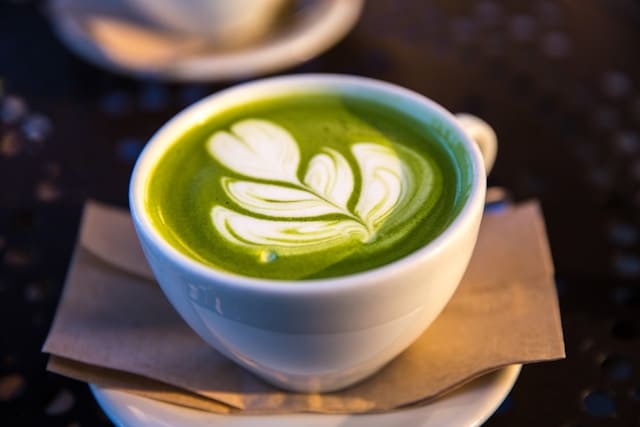If you’ve ever struggled with energy crashes after coffee or wanted a healthier way to boost focus and metabolism, matcha tea might be your perfect solution. Unlike regular green tea, matcha tea is a powdered powerhouse packed with antioxidants, amino acids, and essential nutrients. Its unique preparation and consumption allow you to reap the full benefits of the tea leaf, making it one of the most potent superfoods available today. But what makes matcha so special, and why has it been celebrated for centuries? Here are some proven health benefits of matcha tea you can’t miss out on:

What is Matcha Tea?
Matcha is a finely ground powder made from specially grown and processed green tea leaves. Unlike traditional green tea, which involves steeping the leaves and discarding them, matcha is consumed whole, providing a concentrated dose of nutrients. The tea plants are shade-grown for several weeks before harvest, increasing their chlorophyll and amino acid content. This results in the vibrant green color and rich umami flavor that distinguishes matcha from other herbal teas.
The Origin of Matcha Tea
Matcha tea has deep roots in Japanese culture, dating back to the 12th century. It was introduced by Buddhist monks who discovered that drinking matcha before meditation helped them maintain alertness and focus. Over time, it became an integral part of the traditional Japanese tea ceremony, symbolizing mindfulness and harmony. Today, matcha’s popularity has expanded worldwide, with people embracing it for both its cultural significance and impressive health benefits.
Different Grades of Matcha
Not all matcha is created equal. The quality and intended use of matcha vary based on its grade:
Ceremonial-Grade Matcha: The highest quality, with a smooth, vibrant green color and a naturally sweet taste. It is primarily used for traditional tea ceremonies and is best consumed on its own with water.
Premium-Grade Matcha: A step below ceremonial-grade but still excellent for drinking. It has a balance of flavor and affordability, making it great for lattes or smoothies.
Culinary-Grade Matcha: More bitter and less vibrant in color, this grade is ideal for baking, cooking, and mixed beverages like matcha-flavored desserts and protein shakes.
How Matcha is Grown and Processed
Matcha’s superior nutritional profile comes from its unique cultivation process:
Shading Process: Matcha plants are shaded for about three weeks before harvest, increasing chlorophyll and L-theanine content, which contributes to its bright green color and calming effects.
Stone-Ground Processing: The leaves are meticulously ground into a fine powder using granite stone mills to preserve nutrients and maintain a smooth texture.

The Benefits of Drinking Matcha Tea
Rich in Antioxidants
One of the most significant advantages of matcha is its exceptionally high antioxidant content. According to a study published in the Journal of Chromatography A, matcha contains up to 137 times more epigallocatechin gallate (EGCG), a powerful catechin, than regular green tea. Antioxidants help combat oxidative stress, reduce inflammation, and lower the risk of chronic diseases.
Enhances Brain Function
Matcha contains a unique combination of caffeine and L-theanine, which provides a sustained energy boost without the jitters associated with coffee. L-theanine promotes relaxation and enhances cognitive function by increasing alpha wave activity in the brain. A 2020 study published in Nutrients found that participants who consumed matcha showed improved attention, memory, and reaction time.
Matcha’s Role in Mental Wellness and Stress Reduction
L-theanine, an amino acid unique to matcha, has been shown to reduce stress and anxiety while promoting relaxation. Research suggests it enhances alpha brain wave activity, leading to improved focus and a state of calm alertness.
Supports Heart Health
Regular consumption of matcha has been linked to improved cardiovascular health. Research suggests that catechins in matcha help lower LDL cholesterol levels, reduce blood pressure, and enhance overall heart function. A 2019 meta-analysis published in the American Journal of Clinical Nutrition found that green tea consumption was associated with a reduced risk of heart disease and stroke.
Boosts Metabolism and Aids Weight Loss
If you’re looking for a natural way to support weight management, matcha might be an excellent addition to your routine. Studies indicate that EGCG in matcha enhances fat oxidation and increases calorie burning. According to a 2018 study in the International Journal of Sport Nutrition and Exercise Metabolism, individuals who consumed matcha before exercising burned 17% more fat compared to those who didn’t.
Detoxifies the Body
The shade-growing process of matcha increases its chlorophyll content, which acts as a natural detoxifier. Chlorophyll helps remove heavy metals and harmful toxins from the body, promoting overall well-being and improved liver function.
Strengthens the Immune System
Matcha’s combination of catechins, vitamins, and minerals supports immune function by enhancing the body’s defense against infections. A 2022 study published in Food & Function highlighted that EGCG in matcha has antimicrobial properties that help fight bacteria and viruses.

Matcha Tea Benefits for Skin
If you’re searching for a natural way to achieve radiant skin, matcha tea might be the answer. Rich in epigallocatechin gallate (EGCG), matcha has powerful anti-inflammatory and antibacterial properties that help reduce acne, redness, and signs of aging. According to a 2022 study published in the Journal of Dermatological Science, EGCG has been shown to protect skin cells from oxidative stress, reducing fine lines and wrinkles. Additionally, matcha’s high chlorophyll content detoxifies the skin by flushing out toxins and promoting a healthy glow.
Does Matcha Tea Help Lose Weight?
Yes! Matcha has been linked to weight loss due to its ability to enhance metabolism and promote fat oxidation. A study published in the International Journal of Obesity in 2020 found that catechins in matcha significantly increased fat burning during exercise. Additionally, matcha helps regulate blood sugar levels, reducing cravings and preventing energy crashes that often lead to overeating. Drinking matcha before a workout can optimize calorie burning while keeping you energized.
Traditional vs. Modern Ways to Prepare Matcha
Traditional Preparation: In Japan, matcha plays a significant role in tea ceremonies, symbolizing mindfulness and respect. Traditional preparation involves whisking the powder with hot water using a bamboo whisk (chasen) to create a frothy, smooth tea.
Modern Recipes: Beyond tea ceremonies, matcha has found its way into contemporary recipes:
- Matcha Latte: Mix matcha with steamed milk (dairy or plant-based) and a touch of honey.
- Matcha Protein Shake: Blend matcha powder with banana, almond milk, and protein powder for an energizing post-workout drink.
- Matcha Overnight Oats: Stir matcha into overnight oats with chia seeds and almond milk for a nutrient-packed breakfast.
Best Time to Drink Matcha for Maximum Benefits
The timing of matcha consumption can influence its benefits:
- Morning: A great coffee alternative to kickstart your day with sustained energy and mental clarity.
- Pre-Workout: Matcha enhances endurance and fat oxidation, making it an excellent pre-workout beverage.
- Afternoon Slump: A perfect pick-me-up without the risk of an evening caffeine crash.
Is Matcha Tea Good for You? The Verdict
Absolutely! With its impressive nutrient profile, matcha tea is one of the healthiest beverages available. From enhancing brain function and boosting metabolism to improving skin health and supporting the immune system, matcha’s benefits make it a must-have addition to any diet. Whether enjoyed as a hot tea, a latte, or blended into smoothies, incorporating matcha into your routine is a simple yet powerful way to elevate your health.




